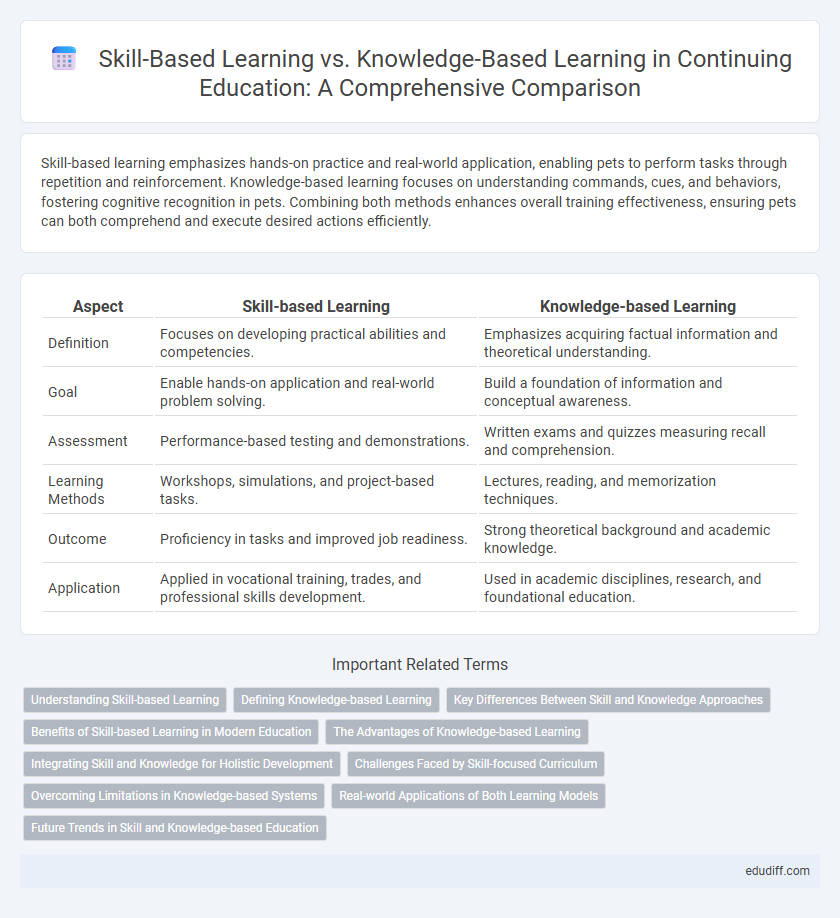Skill-based learning emphasizes hands-on practice and real-world application, enabling pets to perform tasks through repetition and reinforcement. Knowledge-based learning focuses on understanding commands, cues, and behaviors, fostering cognitive recognition in pets. Combining both methods enhances overall training effectiveness, ensuring pets can both comprehend and execute desired actions efficiently.
Table of Comparison
| Aspect | Skill-based Learning | Knowledge-based Learning |
|---|---|---|
| Definition | Focuses on developing practical abilities and competencies. | Emphasizes acquiring factual information and theoretical understanding. |
| Goal | Enable hands-on application and real-world problem solving. | Build a foundation of information and conceptual awareness. |
| Assessment | Performance-based testing and demonstrations. | Written exams and quizzes measuring recall and comprehension. |
| Learning Methods | Workshops, simulations, and project-based tasks. | Lectures, reading, and memorization techniques. |
| Outcome | Proficiency in tasks and improved job readiness. | Strong theoretical background and academic knowledge. |
| Application | Applied in vocational training, trades, and professional skills development. | Used in academic disciplines, research, and foundational education. |
Understanding Skill-based Learning
Skill-based learning centers on acquiring practical abilities directly applicable to real-world tasks, emphasizing hands-on experience and problem-solving over theoretical knowledge. This approach enhances competencies such as communication, technical proficiency, and critical thinking, enabling learners to adapt quickly in dynamic environments. Understanding skill-based learning involves recognizing its role in developing transferable skills that drive performance and innovation across various industries.
Defining Knowledge-based Learning
Knowledge-based learning centers on acquiring and understanding factual information, concepts, and theories through reading, memorization, and comprehension. It emphasizes the retention of data and the ability to recall and explain knowledge accurately. This approach is fundamental in academic settings where mastering subject content forms the basis for higher-order thinking and problem-solving.
Key Differences Between Skill and Knowledge Approaches
Skill-based learning emphasizes practical application and hands-on experience to develop competencies, whereas knowledge-based learning prioritizes the acquisition of theoretical information and concepts. Skill approaches foster problem-solving abilities and adaptability through active engagement, while knowledge approaches focus on memorization and understanding of facts. The key difference lies in skill-based learning driving performance improvement, while knowledge-based learning enhances cognitive understanding.
Benefits of Skill-based Learning in Modern Education
Skill-based learning enhances critical thinking, problem-solving, and adaptability, essential for thriving in today's dynamic job market. It promotes practical experience and real-world application, bridging the gap between theoretical knowledge and workplace demands. This approach fosters lifelong learning, equipping students with transferable skills that support continuous personal and professional growth.
The Advantages of Knowledge-based Learning
Knowledge-based learning provides a strong foundation of theoretical understanding essential for complex problem-solving and critical thinking across disciplines. Emphasizing facts, concepts, and principles enables learners to develop a comprehensive framework that supports lifelong education and adaptability in various professional fields. This approach enhances cognitive skills, fostering deeper analytical abilities and informed decision-making.
Integrating Skill and Knowledge for Holistic Development
Integrating skill-based learning with knowledge-based learning creates a comprehensive educational approach that fosters both practical competence and conceptual understanding. This fusion enhances critical thinking, problem-solving abilities, and adaptability by linking theoretical knowledge with real-world applications. Emphasizing project-based tasks and experiential learning bridges the gap between academic content and skills, promoting holistic development essential for personal and professional success.
Challenges Faced by Skill-focused Curriculum
Skill-focused curriculum faces challenges including limited adaptability to varying student learning paces and the difficulty of assessing practical competencies objectively. Instructors often require specialized training to effectively deliver skill-based content, increasing resource demands. Moreover, integrating skill acquisition with foundational theoretical knowledge remains a complex educational balance.
Overcoming Limitations in Knowledge-based Systems
Skill-based learning enhances adaptability by emphasizing practical application and real-time problem-solving, overcoming the rigidity of knowledge-based systems that rely heavily on static data and predefined rules. Integrating experiential learning techniques with knowledge-based models allows learners to develop critical thinking and creativity beyond mere information recall. This approach addresses the limitations of traditional knowledge-based systems by fostering transferable skills and dynamic understanding in complex, evolving environments.
Real-world Applications of Both Learning Models
Skill-based learning emphasizes hands-on practice and the development of practical abilities, enabling individuals to perform specific tasks effectively in real-world scenarios such as technical trades or software usage. Knowledge-based learning focuses on understanding concepts, theories, and information, providing a foundation for critical thinking and problem-solving in fields like medicine, law, or academia. Combining both models enhances adaptability and competence by allowing learners to apply theoretical knowledge through practical skills in diverse professional environments.
Future Trends in Skill and Knowledge-based Education
Future trends in skill-based learning emphasize personalized, technology-driven approaches, integrating artificial intelligence to tailor training to individual strengths and industry demands. Knowledge-based education is evolving to prioritize critical thinking and interdisciplinary understanding, supported by digital platforms that facilitate lifelong learning and global collaboration. Hybrid models combining skill development with knowledge acquisition are becoming the norm to prepare learners for dynamic job markets and rapid technological advancements.
Skill-based Learning vs Knowledge-based Learning Infographic

 edudiff.com
edudiff.com